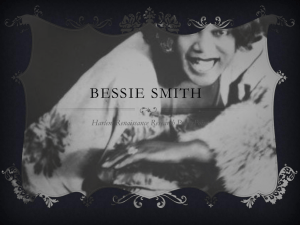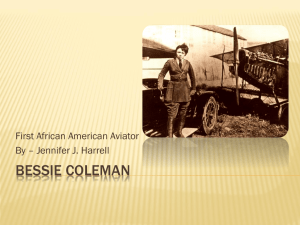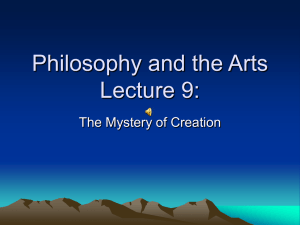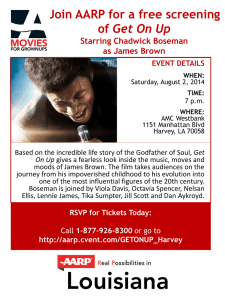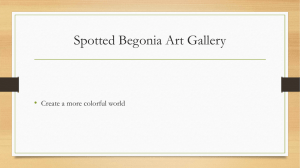Contemporary Artists
advertisement
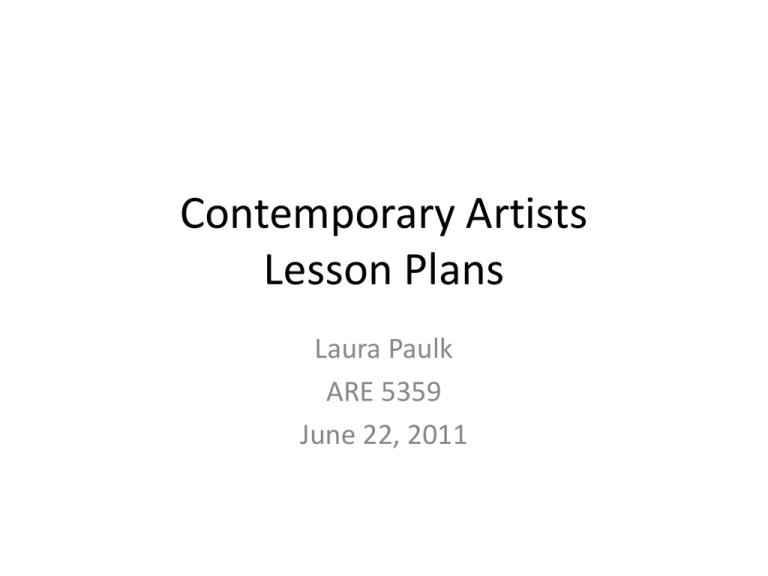
Contemporary Artists Lesson Plans Laura Paulk ARE 5359 June 22, 2011 Benny Carter Little Apple Benny Carter Come to Me, My Children Benny Carter The Day the World Changed Benny Carter • Students will analyze the paintings using the steps of describe, analyze, interpret, and judge (Linderman, 1996). • Students will learn how art can depict a place or event of significance to the artist. • Students will understand how color can affect the mood and meaning of a painting. • Students will explore why certain places are important to people. • Students will create a painting of a place or event that has meaning to them and draws on their live experiences. Bessie Harvey First Washing Machine, 1986 Bessie Harvey Cotton Pickers, 1989 Bessie Harvey Seven Days of the Week, 1994 Bessie Harvey • “Today, more than ever, young people need opportunities to authentically engage in autobiography and storytelling, and connect with issues that matter to them” (Klein, 2008). • Students will learn about the life and works of folk artist Bessie Harvey • Students will learn that art can tell a story and draw on your life experiences • Students will learn that recording cultural information is an important part of leaving a legacy • Students will incorporate found objects, wood, paint, and fabric into a sculpture showing an activity that has significance to them Got Milk? Campaign • Students will study how visual culture impacts their lives everyday through television, the internet, magazines, and billboards. • Students will learn about power used in advertising and how it can be negotiated, not simply accepted and absorbed. • Students will discuss the influence celebrities and athletes have over them. • Students will write about what they interpret the message of these ads to be and consider any inconsistencies or exaggerations in the campaign. Jaune Quick-To-See Smith Trade (Gifts For Trading Land With White People), 1992 Oil, collage on canvas Jaune Quick-To-See Smith Buffalo, 1992 Mixed Media collage on canvas diptych Jaune Quick-to-see Smith Paper Dolls for a Post-Columbian World with Ensembles Contributed by U.S. Government Watercolor and Pencil on photocopy Jaune Quick-To-See Smith • Students will learn how Jaune Quick-To-See Smith addresses political, social, and environmental issues in her art. • Students will identify the symbols Smith uses and what they represent. • Students will see how juxtaposition and layering create a striking composition (Gude, 2007). • Students will discuss symbols they would use to represent their personal and cultural identity. • Students will create original collage using these symbols to communicate a message about something that concerns them Andrea Zittel A-Z 1994 Living Unit Andrea Zittel A-Z Escape Vehicle 1996 Andrea Zittel A-Z Cellular Compartment Units, 2001 Andrea Zittel • “Attuning students to vitally experiencing everyday life should be a goal of any systematic art education. Students will learn to notice and to shape the world around them” (Gude, 2007). • Students will be encouraged to consider how design and consumerism are related. • Students will understand how they can draw on their day to day activities for exploration and experimentation. • Students will design a living space based on their needs and desires. Media Study • AT & T U-verse Commercial Polite Dinner http://www.youtube.com/watch?v=Q_CFXIlsuc0&feature=player_profilepage • Oscar Mayer hot dog commercial http://www.youtube.com/watch?v=ElC9s_Om5Ew AT&T U-verse Commercial • Students will study the impact that visual culture has on their everyday lives • They will analyze this commercial in terms of power, ideology, multimodality (Duncum, 2010) • Students will compare the commercial to experiences in their own lives • What is the intended message versus how you interpreted the commercial? References AT&T U-verse commercial (2011). Retrieved from http://www.youtube.com/watch?v=Q_CFXIlsuc0 Carter, Benny (Artist). Little Apple [Acrylic on board]. Retrieved from http://www.artisticspiritgallery.com/gallery/image.php?inventory_id=547 Carter, Benny (Artist). Come to Me, My Children [Acrylic on board]. Retrieved from http://www.artisticspiritgallery.com/gallery/image.php?inventory_id=543 Carter, Benny (Artist). The Day the World Changed [House paint on wood]. Retrieved from http://focalart.com/ Duncum, P. (2010). Seven principles for visual culture education. Art Education, 6-10. Got Milk? (2011). Julianne Hough Ad. Retrieved from http://www.bodybymilk.com/celeb_hough.php Got Milk? Chris Bosh Ad. Retrieved from http://www.bodybymilk.com/celeb_chris_bosh2.php Got Milk? Taylor Swift Ad. Retrieved from http://www.bodybymilk.com/celeb_gallery.php Gude, O. (2007). Principles of possibility: Considerations for a 21st-century art & culture curriculum. Art Education, 60(1), 6-17. Harvey, Bessie (Artist). (1989). Cotton Pickers [Painted wood, wood putty, fabric, cotton, straw, beads]. Estate of Bessie Harvey, Retrieved from http://sunsite.utk.edu/bessie/sculpture/Cotton_Pickers/ Harvey, Bessie (Artist). (1986). The First Washing Machine [Painted wood, wood putty, cloth, aluminum, beads and wire]. Estate of Bessie Harvey, Retrieved from http://sunsite.utk.edu/bessie/sculpture/First_Washing_Machine/ Harvey, Bessie (Artist). (1994). Seven Days of the Week [Painted wood, wood putty, fabric, metal, plastic and found objects]. Estate of Bessie Harvey, Retrieved from http://sunsite.utk.edu/bessie/sculpture/Seven_Days_of_the_Week/ Klein, S. (2008). Comic liberation: The feminist face of humor in contemporary art. Art Education, 61(2), 47-52. Linderman,M.G. (1996). Chapter 11: Art analysis: Looking at and responding to art. Art in the elementary school (pp.215-228). McGraw Hill. Smith, Jaune Quick-To-See (Artist). (1992). Buffalo [Mixed media collage on canvas diptych], ARTstor Slide Gallery, University of California, San Diego. Smith, Jaune Quick-To-See (Artist). (1992). Trade (Gifts for Trading Land with White People) [Oil, collage on canvas], ARTstor Slide Gallery, University of California, San Diego. Smith, Jaune Quick-To-See (Artist). (1991). Paper Dolls for a Post-Columbian World with Ensembles Contributed by U.S. Government [Watercolor and pencil on photocopy], ARTstor Slide Gallery, University of California, San Diego. Zittel, Andrea (Artist). (1996) A-Z Escape Vehicle [exterior: steel, insulation, wood & glass interior: colored lights, water, fiberglass, papier-mache, pebbles, paint], The Museum of Modern Art. Zittel, Andrea (Artist). A-Z 1994 Living Unit [steel, wood, metal, mattress, grass, mirror, lighting fixture, stove, oven, and green velvet] Zittel, Andrea (Artist). (2001) A-Z Cellular Compartment Units [stainless steel, plywood, glass & mixed media], Exhibit at Andrea Rosen Gallery, Winter 2002.
